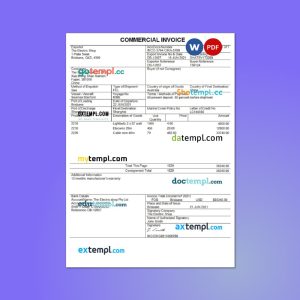A commercial invoice is a legal document that is used in international trade transactions. It serves as a record of the transaction between the buyer and seller, and it includes important information about the goods being shipped, the terms of the sale, and the payment details.

A full description of a commercial invoice typically includes the following elements:
- Sender and recipient information: This includes the name, address, and contact details of the seller (exporter) and the buyer (importer).
- Invoice number and date: Each invoice should have a unique identifier
- number and a date that reflects the date the invoice was created.
- Shipping information: This section should include the shipping date, the port of departure, and the port of arrival.
- Product information: The invoice should provide a detailed description of the goods being shipped, including their name, quantity, unit price, and total value.
- Harmonized System (HS) codes: HS codes are used to classify goods for customs purposes, and they should be included on the invoice.
- Terms of sale: This section should outline the agreed-upon terms of the sale, including the payment terms, the delivery terms, and any warranties or guarantees.
- Payment details: This section should provide information about the payment method, such as the bank account details, the payment due date, and any other relevant information.
- Signatures: The invoice should be signed by the seller and the buyer to indicate that they agree to the terms of the transaction.
It’s important to ensure that all the information provided on the commercial invoice is accurate and complete, as any errors or omissions could lead to delays in the shipment or even customs issues.
Who needs a commercial invoice?
A commercial invoice is required for any international trade transaction involving the export or import of goods. Therefore, any seller (exporter) or buyer (importer) involved in cross-border trade should prepare or receive a commercial invoice. This includes businesses of all sizes, from small-scale individual traders to large multinational corporations.
Customs officials in both the exporting and importing countries use commercial invoices to verify the value, quantity, and description of the goods being shipped. The invoice serves as a legal document that provides proof of ownership and payment for the goods. It also helps to calculate the taxes, duties, and other fees that may be applied to the shipment.
In addition to customs officials, other parties involved in the international trade transaction may also require a commercial invoice. For example, banks may require a commercial invoice to process payment, and insurance companies may use the invoice to determine the value of the goods for insurance purposes.
Overall, a commercial invoice is a crucial document for anyone involved in international trade and should be prepared with accuracy and attention to detail.
In conclusion, a commercial invoice is a critical document that plays a vital role in international trade transactions. It serves as proof of ownership and payment for the goods being shipped and helps to calculate taxes, duties, and other fees that may apply. The invoice should provide a detailed description of the goods, including their quantity, value, and HS codes, as well as information about the seller, buyer, payment terms, and shipping details. Accurate and complete commercial invoices are essential to ensure smooth customs clearance and timely delivery of the goods. Businesses of all sizes involved in cross-border trade should ensure that they prepare or receive commercial invoices that comply with the relevant laws and regulations.
If you want to explore more about the commercial invoices click here: commercial invoice
